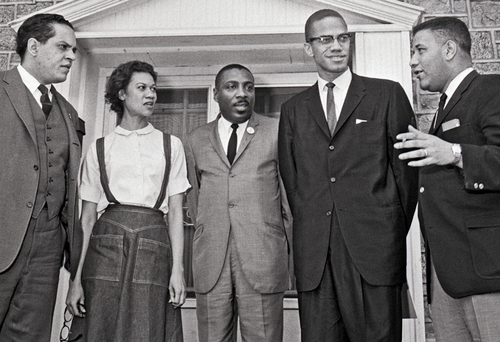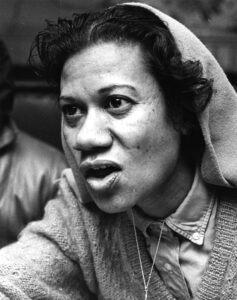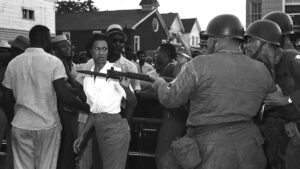

Gloria Richardson was a trailblazing activist who played a critical role in the 1960s Civil Rights Movement. As the leader of the Cambridge Movement in Maryland, she fought against segregation, economic inequality, and racial discrimination, leaving behind a legacy of resistance and empowerment.
A Leader in the Fight for Justice
Unlike many of the well-known civil rights campaigns centered in the Deep South, Richardson’s work focused on Cambridge, Maryland, where Black residents faced systemic racism, economic oppression, and police violence. She became the leader of the Cambridge Nonviolent Action Committee (CNAC), organizing protests, sit-ins, and boycotts to demand equal rights.
A Champion of Armed Self-Defense
Richardson’s approach to civil rights activism stood apart from the traditional nonviolent philosophy championed by leaders like Martin Luther King Jr. She believed in the right of Black communities to defend themselves against racist violence. While she never encouraged aggression, she openly supported the idea that African Americans should not be passive victims of oppression.
Breaking Barriers as a Woman Leader
In an era when men dominated civil rights leadership, Richardson became one of the few women to lead a major movement. As head of the CNAC, she was instrumental in pushing for economic and social reforms in Cambridge, making history as the first woman to lead a civil rights movement outside the South. Her leadership helped pave the way for future female activists in the struggle for racial justice.
A Symbol of Resistance
 One of the most iconic images of the Civil Rights Movement captures Gloria Richardson fearlessly pushing away a National Guardsman’s rifle during a 1963 protest. This powerful moment, frozen in time, became a symbol of Black defiance and determination against oppression. The photograph solidified Richardson’s place in history as a fearless leader unwilling to back down.
One of the most iconic images of the Civil Rights Movement captures Gloria Richardson fearlessly pushing away a National Guardsman’s rifle during a 1963 protest. This powerful moment, frozen in time, became a symbol of Black defiance and determination against oppression. The photograph solidified Richardson’s place in history as a fearless leader unwilling to back down.
A Lasting Legacy
 Although she later stepped away from the national spotlight, Richardson’s influence shaped later movements, including the Black Power Movement and modern social justice activism. Her commitment to economic justice, self-defense, and community empowerment remains an inspiration for activists today. She passed away in 2021 at the age of 99, leaving behind a legacy of strength, courage, and unyielding resistance.
Although she later stepped away from the national spotlight, Richardson’s influence shaped later movements, including the Black Power Movement and modern social justice activism. Her commitment to economic justice, self-defense, and community empowerment remains an inspiration for activists today. She passed away in 2021 at the age of 99, leaving behind a legacy of strength, courage, and unyielding resistance.
Gloria Richardson’s fight for equality and justice continues to resonate, reminding us that progress is built on the shoulders of those who dare to challenge the status quo.
Visits: 18
